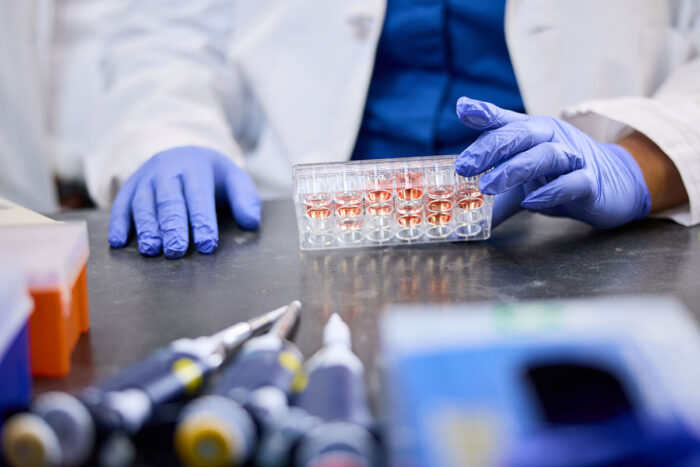Awardees announced for Needleman innovation, commercialization program
DeSelm, DiPersio, Lavine receive support to advance promising therapeutics in cancer, heart disease
 Matt Miller
Matt MillerThe university’s recently established Needleman Program for Innovation and Commercialization (NPIC) will provide critical funding to help move research toward early-stage clinical trials and commercialization. The first three awardees are Carl DeSelm, MD, PhD, John F. DiPersio, MD, PhD, and Kory Lavine, MD, PhD. More information about how to apply for the second round of funding is below.
Three Washington University researchers developing promising therapeutics for cancer and heart disease have been named the inaugural awardees of an innovative, new program that provides critical funding to help move research toward early-stage clinical trials and commercialization. The awardees — Carl DeSelm, MD, PhD, John F. DiPersio, MD, PhD, and Kory Lavine, MD, PhD — will receive financial support from the university’s recently established Needleman Program for Innovation and Commercialization (NPIC).
The program is supported by a $15 million commitment from Philip and Sima Needleman, longtime university benefactors. Philip Needleman, PhD, is an emeritus trustee of Washington University and a former head of what was then the Department of Pharmacology at the School of Medicine from 1976-89. He also had a long and successful career in the pharmaceutical industry, where he developed new drugs including the blockbuster Celebrex, which has been widely prescribed to treat osteoarthritis, rheumatoid arthritis and similar inflammatory conditions.
“NPIC is a key part of a universitywide campaign to boost drug development and move promising therapeutics generated by WashU investigators into early-stage clinical trials,” said David H. Perlmutter, MD, executive vice chancellor for medical affairs, the George and Carol Bauer Dean, and the Spencer T. and Ann W. Olin Distinguished Professor. “It is exciting to see the program issue this first round of awards to such promising innovations. We look forward to seeing these projects make their way down the drug development pathways necessary to achieve investigational new drug status.”
The inaugural awardees and their projects are:
- Carl DeSelm, MD, PhD, an assistant professor of radiation oncology, is developing new cell-based immunotherapies to be effective against solid tumors such as breast cancer and lung cancer. Current cell-based therapies, while highly effective against certain leukemias and lymphomas, don’t work in patients with solid cancers in part because of their 3D complexity. DeSelm’s goal is to create therapeutic cells — called chimeric antigen receptor (CAR) antigen presenting cells — that would give the immune system numerous target options specific to each patient’s tumor. Going after multiple patient-specific targets simultaneously could improve the response and the ability to cure a wide range of cancers, including solid tumors that don’t respond to conventional or other immune therapies.
- John F. DiPersio, MD, PhD, the Virginia E. & Sam J. Golman Professor of Medicine, is developing improved methods to collect sufficient numbers of stem cells from donors. Those stem cells are then given to patients as treatments for blood cancers. Stem cells also are needed for stem-cell based gene therapies for inherited genetic disorders, such as sickle cell disease and beta-thalassemia. But in some cases, sufficient stem cells can’t be collected from donors, which reduces the success of stem cell transplants. DiPersio’s group has developed novel small molecules that induce more robust and rapid mobilization of stem cells.
- Kory Lavine, MD, PhD, a professor of medicine and the Alan A. and Edith L. Wolff Professor of Cardiology, is developing new immune-based treatments for inflammatory heart disease, especially heart failure. Many forms of inflammatory heart disease worsen over time and have no cure. Lavine’s work has revealed that certain immune cells, called CCR2+ macrophages, drive inflammation in the heart after heart attacks or due to genetic forms of heart disease. His group has developed an inhibitor that can block the activation of these inflammatory immune cells and possibly serve as a treatment for heart disease.
“These three projects epitomize what we are looking for in terms of their potential to produce novel drug candidates,” said Shripad Bhagwat, PhD, senior director of the Needleman Program for Innovation and Commercialization and a research professor of biochemistry and molecular biophysics. “Each has a unique approach and is focused on therapeutic areas with unmet needs for new and better treatment strategies. We look forward to working with these investigators as they take their innovations to the next level. I am hopeful that these projects will lead to groundbreaking new drugs for the treatment of diseases.”
Funding through NPIC is not a traditional grant. The program was established to provide Washington University innovators with funding — normally not available from traditional sources such as the National Institutes of Health (NIH) — and expert development advice and guidance to expeditiously advance important fundamental discoveries toward clinical testing.
The critical experiments that will be conducted over the next eight to 12 months for the three selected proposals are estimated to cost over $1 million. The results of these studies will help decide the next steps and additional funding support.
The first request for proposals attracted 16 submissions, which were evaluated by an expert review panel for their scientific merits and deficiencies. In addition, feedback for all of the submitted proposals was provided suggesting critical experiments and data to facilitate future efforts.
“The goal of NPIC is to provide a new center of excellence at WashU focused on guiding wonderful discoveries along a true clinical path,” Needleman said. “These projects have the potential to produce breakthrough medications, and I am optimistic about the promise of identifying more of these innovations from WashU investigators in the future.”






